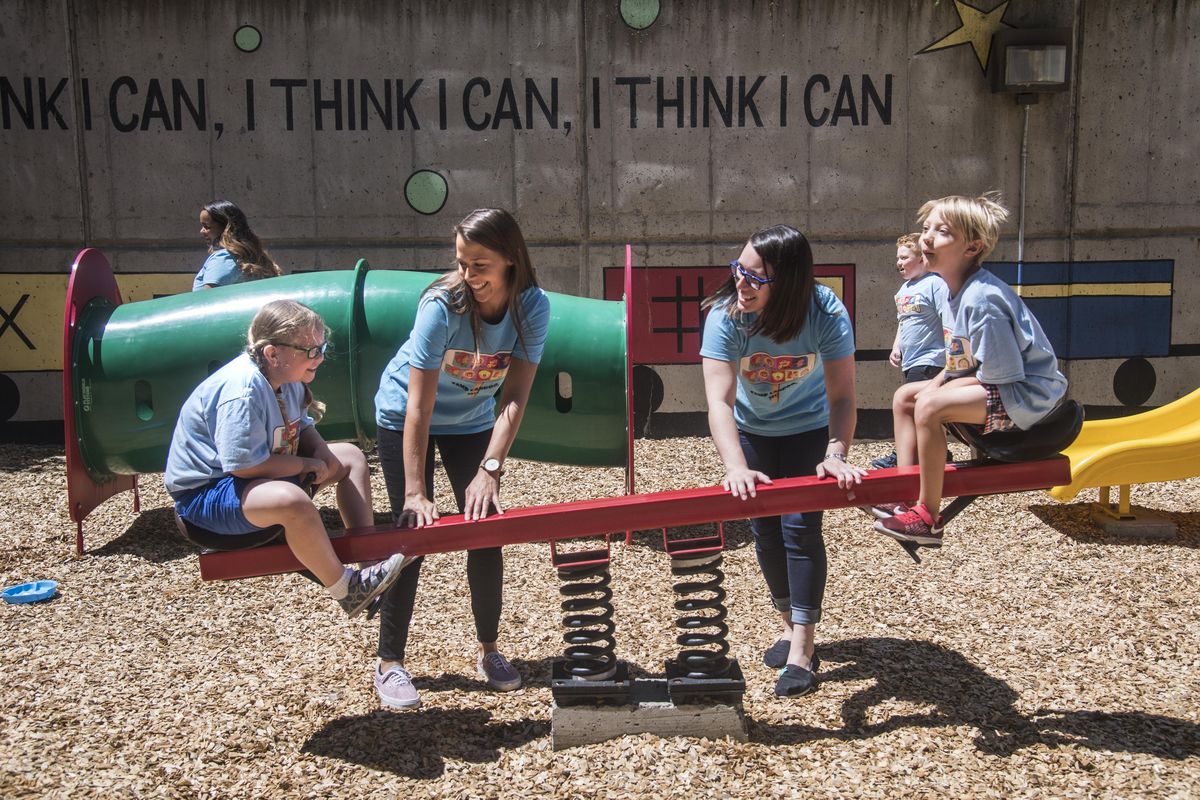WSU’s Camp Candoo mixes fun and friendship for children with speech disorder

One year ago, Griffen Grames could barely say his own name.
Griffen, 7, has speech apraxia, a motor disorder that makes it hard to plan speech. He knows what he wants to say, but has trouble moving his mouth into the correct positions.
But after his second year at a Washington State University camp in Spokane, Griffen spoke confidently with Casandra Eng, a speech therapy graduate student who served as his “friend” for the week.
He told Eng he recently had sushi with his family for his birthday and explained his favorite sport was now soccer, not Seahawks football. When Eng said she grew up in a military family, Grames chimed in.
“Moms don’t go to war. Only grandpas and dads,” he said.
Eng replied, “Well, my mom went to Iraq. Moms can go sometimes, too.”
Griffen nodded, accepting the new information. He then rattled off a list of phrases he’s been practicing all week: “Oops, I didn’t mean to,” “That hurt my feelings,” and “I want to play, too.”
Camp Candoo, a joint effort of WSU and Eastern Washington University, is now in its fifth year on the WSU Spokane campus. Run by two WSU speech therapy professors, the camp offers graduate speech therapy students a chance for practical experience, and offers children and families the opportunity to get help targeted specifically at apraxia, a relatively rare motor disorder.
Campers range from age 5 to 10 and come from as far away as Florida to attend, though priority is given to kids from Washington and returning campers. The first year started with seven campers; now, they’re up to 16.
Before attending camp last summer, Tammy Hollaway said her son, Isaia, was shy because no one besides his parents and one sister could understand him.
“He was closing himself off,” she said. “It really affected him socially.”
After one summer at camp, his confidence grew, in part because he got to know other kids who struggled with talking. Holloway brought him back for a second summer this year.
Nancy Potter, one of the camp’s two directors, said the camp is narrowly focused on children with severe apraxia, a disorder that occurs in less than 1 percent of children. Parents submit videos of their children speaking, and the camp focuses on kids who barely talk.
“The No. 1 reason that we turn them away is they talk too well,” Potter said.
Families pay $900 for the week and WSU can bill insurance for part of the cost.
It’s easy to take speech for granted, but it requires many things in the body and brain to line up perfectly. Our brains have to think of words to say, then translate those into movements of the lips and tongue to produce sound.
For kids with apraxia, it’s not as simple as pronouncing individual sounds or syllables, Potter said. The position of the mouth and tongue while saying a particular sound depend on what’s said before and after.
Saying both “boo” and “bee” require a speaker to pronounce the “b” identically. But the vowels following it change mouth position: we say “boo” with rounded, puckered lips and “bee” with lips spreading out to the side. Most people make the change without thinking about it, but people with apraxia have to learn the lip and mouth movements to make each sound work.
“They know what they want to say. They just get the sounds mixed,” Potter said.
At Camp Candoo, kids get a speech therapy graduate student assigned to them for the week, and mix individual therapy with group activities. During arts and crafts, they practice speech by asking therapists for supplies.
Many kids, who fear speaking at school because they’ll be teased, open up at camp because other kids sound just like them, Potter said.
Therapy focuses on helping kids learn physical cues for pronouncing words and phrases. That might mean sitting face-to-face with a speech therapist who guides the child’s mouth through correct movements while mirroring them.
Griffen’s mother, Tana Grames, said her son’s two years at camp have been life-changing. The family is from Auburn, Washington. Before Griffen’s first year of camp, his parents mostly communicated with him through gestures, asking yes-no questions and letting him show them things.
“We couldn’t understand hardly anything,” she said of his speech. Sign language might seem like a logical adaptation, but Grames said Griffen had trouble learning the signs. The same motor planning issues that give him trouble with speech made using his hands to speak difficult, too.
At camp last summer, he worked hard, making more progress in two weeks than he’d ever been able to make in school speech therapy. Potter recalled he initially didn’t want to keep practicing phrases, but that he was willing to work harder if he was able to carry or push a heavy object around while talking.
“He’s a total sensory-seeker,” Potter said.
When Grames asked Griffen if he wanted to return to camp this year, he told her, “Mom, yes! They helped me so much!”
The memory makes Grames tear up.
“He’s gone leaps and bounds,” she said.
This article was updated to clarify that the camp is a joint WSU and EWU effort, and to correct the university affiliation of some graduate students in photo captions.